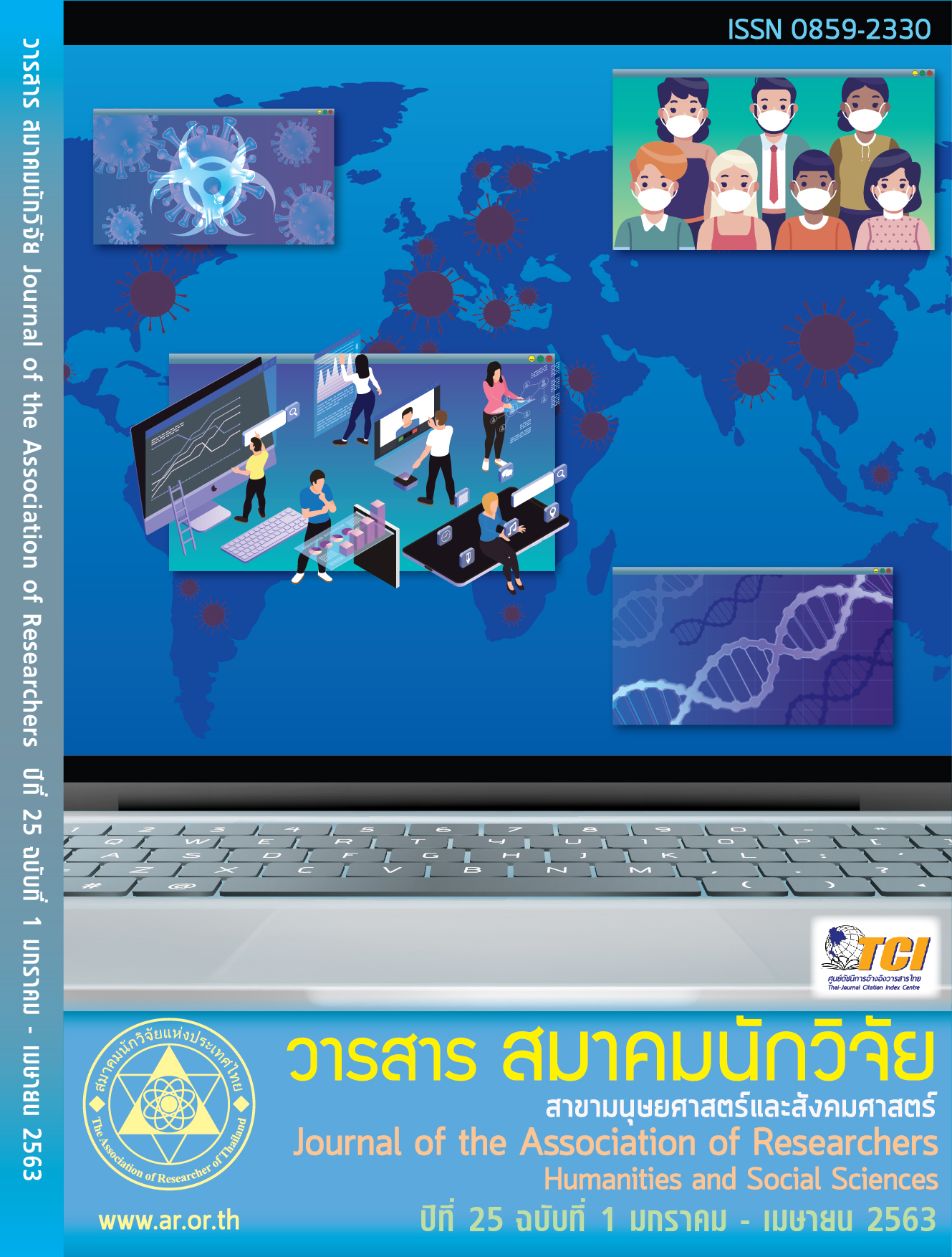Enhancement of Sustainable Competitive Capabilities of Thai Clothing Entrepreneurs
Main Article Content
Abstract
Thai clothing entrepreneurs are affected by a decrease in the number of goods purchase from within and outside the country. At the same time, production costs also increase and customers turn to order goods from neighboring countries due to the lower labor cost in China and Vietnam. Moreover, there is more intense competition in this business within the country. The objectives of this research were to study factors affecting the enhancement of the sustainable competitive capabilities of Thai clothing entrepreneurs. This research utilized a quantitative method. The sample consisted of 240 Thai clothing entrepreneurs, selected via multi-stage sampling. The sample size was determined based on the criterion of 20 times the observed variables. Data were collected with the use of a questionnaire and analyzed with a structural equation model. The research findings showed that marketing had the greatest effect on the enhancement of the sustainable competitive capabilities of Thai clothing entrepreneurs, followed by capabilities in the clothing industry, and the management of clothing industry, respectively. These findings can help Thai clothing entrepreneurs to enhance their competitive capabilities by paying an attention based on the significance of the influencing factors namely: marketing; capabilities in the industry; and the management of the clothing industry. This practice can generate incomes to the country sustainably.
Article Details
บทความที่ปรากฏในวารสารนี้ เป็นความรับผิดชอบของผู้เขียน ซึ่งสมาคมนักวิจัยไม่จำเป็นต้องเห็นด้วยเสมอไป การนำเสนอผลงานวิจัยและบทความในวารสารนี้ไปเผยแพร่สามารถกระทำได้ โดยระบุแหล่งอ้างอิงจาก "วารสารสมาคมนักวิจัย"
References
ชาย โพธิสิตา (2554) ศาสตร์และศิลป์แห่งการวิจัยเชิงคุณภาพ พิมพ์ครั้งที่ 5 กรุงเทพฯ อมรินทร์พริ้นติ้งแอนด์พับลิชชิ่ง
นวัตกรรมสีเขียวอุตสาหกรรมเป็นมิตรสิ่งแวดล้อม (2561) สืบค้นเมื่อ พฤษภาคม 30, 2562 , จาก www.prachachat.net
สำนักงานคณะกรรมการพัฒนาการเศรษฐกิจและสังคมแห่งชาติ (2560) แผนพัฒนาการเศรษฐกิจและสังคมแห่งชาติ ฉบับที่ 12 พ.ศ. 2560-2564 กรุงเทพฯ: ผู้แต่ง
สำนักงานปลัดกระทรวงอุตสาหกรรม (2560) กรมโรงงานอุตสาหกรรม สืบค้นเมื่อ ธันวาคม 20 ,2561, จาก www.greenindustriy.diw.go.th
สำนักงานปลัดกระทรวงอุตสาหกรรม (2559) แผนยุทธศาสตร์กระทรวงอุตสาหกรรม พ.ศ. 2560-2564 (ฉบับทบทวน) กรุงเทพฯ: กระทรวงอุตสาหกรรม
Avolio, B. J. & Bass, B. M. (2004). Multifactor Leadership Questionnaire: Third Edition Manual. New York: Mind Garden INC
Bartelmus P. (2013). The future we want: Green growth or sustainable development ? Environmental Development , 7, 165-170
Beer, M. (2010). Managing Change and Transition. Harvard: Harvard Business School Publishing.
Carroll, A. B. (1991). The pyramid of corporate social responsibility: Toward the moral management of organizational stakeholders. Business Horizons, 34(4), 39-48.
Chien, S.,Y. & Tsai C., H. (2012). Dynamic capability, knowledge, learning and firm performance. Journal of Organizational Change Management, 25(3), 434 – 444.
Dangelico, R.M., & Pujari, D. (2010). Mainstreaming green product innovation: Why and how companies integrate environmental sustainability. Journal of Business Ethics. 95(3), 471-486
Dubey, Rameshwar, Gunasekaran, A. & Ali, S. S. (2015). Exploring the relationship between leadership, operational practices, institutional pressures and environmental performance :A framework for green supply chain. International Journal of Production Economics 160, 120-132.
Griffith, R., et al.(2006). Innovation and productivity across four European countries. Oxford review of economic policy, 22(4), 483-498.
Hair, J. F., Black, W. C., Babin, B. J. & Anderson, R. E., (2010). Multivariate data analysis (7th ed.). Upper Saddle River, NJ: Prentice Hall.
Marimuthu, M., Arokiasamy, L., & Ismail, M. (2009). Human capital development and its impact on firm performance: Evidence from developmental economics. The Journal of International Social Research, 2(8), 265-272.
Mele’, D. (2008). Corporate social responsibility theories. In Crane, A. (Eds.), The Oxford handbook of corporate social responsibility ( pp.47–82). New York, New York: Oxford University Press.
Mohsen, A. & Mohammad, R.D. (2011). Considering Transformational Leadership Model in Branches of Tehran Social Security Organization. Social and Behavioral Sciences, 15, 3131-3137.
Nalbantian, R., Guzzo, R. A., Kieffer, D. & Doherty, J. (2004). Play to Your Strengths: Managing your internal labour markets for lasting competitive advantage. New York: McGraw-Hill.
Nastasi, B. K. & Schensul, S. L. (2005). Contributions of qualitative research to the validity of intervention research. Journal of School Psychology, 43(3), 177-195.
Roberts, N. & Grover, V.(2012). Investigating firm's customer agility and firm performance: The importance of aligning sense and respond capabilities. Journal of Business Research, 65(5), 579-585.
Sheng, S., Zhou, K.Z. & Lessassy, L. (2013). NPD speed VS. innovativeness :The contingent impact of institutional and market environments, Journal of Business Research, 66 (11), 2355-2362.
Strand, R. (2011). Exploring the Role of Leadership in Corporate Social Responsibility: A Review. Journal of Leadership, Accountabilities, and Ethics, 8(4), 84-96.
TRANSLATED THAI REFERENCES
Phosita, Chai . (2011). The science and art of qualitative research. Bangkok: Thumrin Printing & Publishing Co. (in Thai).
Green Innovation Industry Friendly Environment. (2018). Retrieved May 30, 2562, from.www.prachachat.net. . (in Thai)
Krutka, Chomsupak. (2011). The demand for human resource development to ASEAN community. An academic journal of Applied Arts, 63-67. (in Thai).
Office of the National Economic and Social Development Board. (2017). National Economic and Social Development Plan No. 12. 2017-2021. (in Thai).
Office of Permanent Secretary, Ministry of Industry. (2017). Department of Industrial Works.
Searched on December 20, 2018, from www.greenindustriy.diw.go.th. (in Thai).
Office of the Permanent Secretary of Industrial affairs. (2016). The strategic plan of Ministry of Industry 2017-2030. Bangkok: Ministry of Industry. (in Thai)


